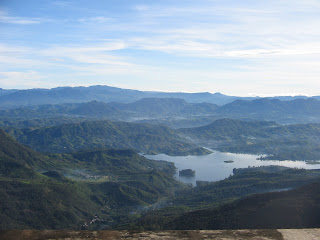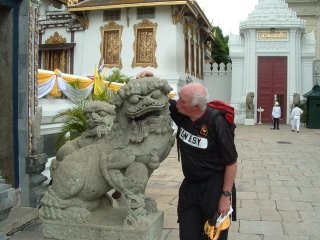 The afternoon I spent exploring the ancient rock fortress of Sigiriya was an afternoon spent in a living fairytale. The lower grounds and garderns were enchatingly green, full of open spaces, crumbling bricks, twisted trees and bubbling fountains. Little paths wound here and there amoung the ruins and one long, red road runs straight towards the rock. It feels like the kind of place where wandering knights are likley to encounter damsels in distress, enchantresses, or dragons in the moat. There is, in fact, a moat, that one must cross over in order to enter. The stone stairs are full of moss and vines drip from the trees. This is a place one might come to while searching for the Holy Grail. Here, hidden amopung the stones, is a cave with a seat carved into the rock and ancient paintings on the wall. Would the orange-robed monk I imagine meditating there, with the rain dripping off the stone, speak and guide the knight on his quest, or has he taken a vow of silence?
The afternoon I spent exploring the ancient rock fortress of Sigiriya was an afternoon spent in a living fairytale. The lower grounds and garderns were enchatingly green, full of open spaces, crumbling bricks, twisted trees and bubbling fountains. Little paths wound here and there amoung the ruins and one long, red road runs straight towards the rock. It feels like the kind of place where wandering knights are likley to encounter damsels in distress, enchantresses, or dragons in the moat. There is, in fact, a moat, that one must cross over in order to enter. The stone stairs are full of moss and vines drip from the trees. This is a place one might come to while searching for the Holy Grail. Here, hidden amopung the stones, is a cave with a seat carved into the rock and ancient paintings on the wall. Would the orange-robed monk I imagine meditating there, with the rain dripping off the stone, speak and guide the knight on his quest, or has he taken a vow of silence?There is a man waiting for me along the path, wanting to sell me a wooden box with four secret compartments and more men in the trees who want to be my guide. I ignore them. I have read a little about the history of the stone and I don't want to know any more. Another day I would be terribly curious about all this, hungry, even, to know more, but today I am not in the mood for facts or for history. I just want to enjoy the
 moment, at my own pace. I am sick of people talking to me, sick of having my experiences turned into transactions where I pull out my wallet at the end of it all and hand out the cash, and I am not particularly in the mood for company.
moment, at my own pace. I am sick of people talking to me, sick of having my experiences turned into transactions where I pull out my wallet at the end of it all and hand out the cash, and I am not particularly in the mood for company.I slowly wander upwards, climbing upon ancient stones, stooping under archways in the rock, following old old paths. The rock itself is a fairytale to me and this is my version of the true historical tale:
Once upon a time there was a king who ruled over the central portion of one of the islands of paradise. With the primary wife in his harem he had a son, and later another woman in his harem gave birth to a son, also. The younger son, fearing that he would never inherit the kingdom and urged on by his counsellors, killed his father, the king and took power, exiling his half brother to India.
 The younger son lived in fear that the rightful inheritor of the kingdom would raise and army and return so he began building a fortress on the summit of a large rock. The rock stands high in the middle of a large central plain. None may appproach without the army seeing them with plenty of warning. The rock itself is high, and siege of the castle would be almost impossible.
The younger son lived in fear that the rightful inheritor of the kingdom would raise and army and return so he began building a fortress on the summit of a large rock. The rock stands high in the middle of a large central plain. None may appproach without the army seeing them with plenty of warning. The rock itself is high, and siege of the castle would be almost impossible.It took the new king seven years to build the fortress, which in those days was both an incredible feat of engineering and of speed. The fountains that were built in the pleasure gardens at the foot of the rock function on anicent principles of gravity and pressure and as such, they still function today, bubbling out into the ancient stone pools.
Although it took the king seven years to build the amazing castle on the rock, it took his half brother ten years to raise an army in southern India and return to Sri Lanka. When the king saw the army approaching across the plain, he seemingly lost all sense of reason and caution, and in a fit of honor, descended from the rock to meet his half brother in battle on the plain. The two armies clashed and fought, but they did not fight for long. The king rode upon an elephant and the elephant took fright. The king lost control of the elephant. The king's army, seeing this,
 thought that the king was ordering a retreat. They retreated to safely, losing many on the way and leaving the king behind, surrounded by the enemy. When the king saw this and realised that he would be captured by his half brother, he fell on his sword and killed himself.
thought that the king was ordering a retreat. They retreated to safely, losing many on the way and leaving the king behind, surrounded by the enemy. When the king saw this and realised that he would be captured by his half brother, he fell on his sword and killed himself.The new king conquered but distained the palace on the rock, prefering to live elsewhere. The rock became the home, once again, of the monks who used to retreat there to meditate and pray and the castle fell to ruin.
What a glorious thing it must have been to rule the land from that castle on the rock. Even at its base, the view was spectacuilar - all the world stretched out before you in one long smoky plain: the rice paddies and fields, the lakes with water buffalos wallowing in the mud, the symmetry of the fountain gardens and the moat.
There was a spiral staircase to climb in order to get to a wall full of gorgeous paintings. As I climb the iron staircase, I am conscious of each foot upon the stair and of the huge space all around me - the terrible drop and the terrific view. Climbing upswards on that perlious stair, I thought, "This is an adventure."
 There is an old man in the picture chamber who takes me past a barricade onto a narrow ledge where there are more crumbling paintings. He is like the caretaker of some hidden tample where knights pass the night to recieve visions. The paintings are all buxom ladies, beautifully depicted, and so often reproduced for tourists that they have become a symbol of Sri Lanka.
There is an old man in the picture chamber who takes me past a barricade onto a narrow ledge where there are more crumbling paintings. He is like the caretaker of some hidden tample where knights pass the night to recieve visions. The paintings are all buxom ladies, beautifully depicted, and so often reproduced for tourists that they have become a symbol of Sri Lanka.Next, I walk along the Mirror Wall. It is about half way up the rock, with a wall between me and the view. The wall is made to shine and reflect through a mixture involving egg whites. The wall is a long sinuous curve, still shining but now etched with graffitti. "What a lot of eggs," I think.
There are monkeys on the stairway ahead of me and so I climb quickly trying to catch up with them and ignore the pain in my muscles (it is only a day since I climbed Sri Pada.) The path opens onto an open plaza before the final stair. A sign reads, "Noise may provoke hornet attacks," and there is a metal cage in which one can hide in the event of an angry swarm. The monkeys have continued climbing. They are now upon the narrow iron stiarcase that leads up to the top of the rock. Two giant lion paws are on either side of the stair. In the past, it is said one had to path through the mouth of the lion at the top to gain entrance to the castle.
 I wish I'd had a picnic with me, to spread out on a blanket at the top of the rock and enjoy while I took in the view. As it was, I found myself a comfortable spot on the rocks and looked down at the plain below. I'm not sure how long I stayed there, perhaps half an hour or more. There weren't many tourists. I have heard that there are times when the staircases are choked with people. Perhaps five groups came up to the top while I was there. None walked around the entire summit of the rock. None stayed longer than five minutes.
I wish I'd had a picnic with me, to spread out on a blanket at the top of the rock and enjoy while I took in the view. As it was, I found myself a comfortable spot on the rocks and looked down at the plain below. I'm not sure how long I stayed there, perhaps half an hour or more. There weren't many tourists. I have heard that there are times when the staircases are choked with people. Perhaps five groups came up to the top while I was there. None walked around the entire summit of the rock. None stayed longer than five minutes.














